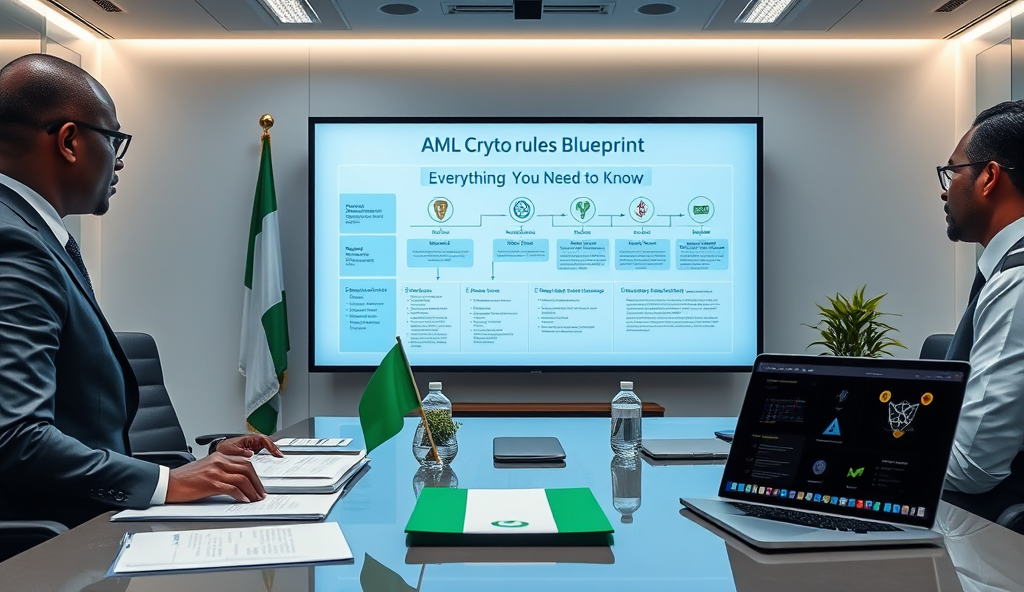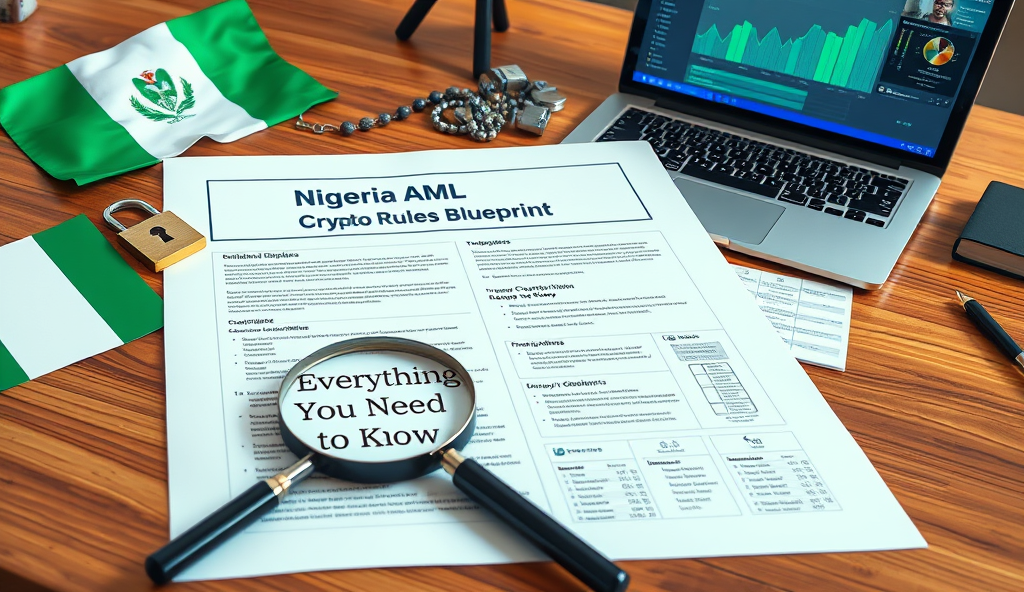Introduction to Nigeria’s AML Crypto Rules Under the New Blueprint
Nigeria’s evolving AML crypto rules reflect the government’s commitment to combating financial crimes while fostering innovation in digital assets. The new blueprint introduces stricter compliance measures for cryptocurrency exchanges, aligning with global standards set by the Financial Action Task Force (FATF).
Exchanges must now implement robust customer due diligence (CDD) procedures, including identity verification for transactions exceeding $1,000, as mandated by the Nigeria SEC crypto regulatory framework. These measures aim to curb illicit activities while maintaining market integrity.
The upcoming section will delve deeper into the specifics of Nigeria’s AML guidelines for digital assets, including transaction monitoring requirements and penalties for non-compliance. This shift signals a maturing regulatory landscape for crypto businesses operating in the region.
Key Statistics

Overview of the New AML Crypto Blueprint in Nigeria
Nigeria's AML crypto blueprint represents a structured approach to regulating digital asset transactions combining FATF recommendations with local financial crime prevention needs.
Nigeria’s AML crypto blueprint represents a structured approach to regulating digital asset transactions, combining FATF recommendations with local financial crime prevention needs. The framework requires exchanges to register with the SEC and implement real-time transaction monitoring systems, reflecting lessons from the 2022 $26 million crypto fraud cases in Lagos.
The blueprint introduces tiered reporting obligations, mandating immediate alerts for transactions above $10,000 and weekly summaries for smaller suspicious activities. These thresholds align with Nigeria’s CBN AML directives while accounting for the unique risks of peer-to-peer crypto trading prevalent in the region.
This comprehensive approach sets the stage for examining specific compliance obligations, including enhanced due diligence for politically exposed persons and mandatory record-keeping protocols. The next section will detail these key AML requirements for crypto exchanges operating under Nigeria’s evolving regulatory landscape.
Key AML Requirements for Crypto Exchanges in Nigeria
Exchanges must maintain detailed records of all transactions for at least five years including customer identification data and transaction histories as stipulated by Nigeria's SEC crypto regulatory framework.
Nigeria’s AML crypto blueprint mandates exchanges to conduct enhanced due diligence for politically exposed persons (PEPs), requiring verification of their source of funds and ongoing transaction monitoring. This aligns with the FATF’s risk-based approach, addressing vulnerabilities exposed in the 2022 Lagos fraud cases where PEPs were implicated in $15 million of the $26 million losses.
Exchanges must maintain detailed records of all transactions for at least five years, including customer identification data and transaction histories, as stipulated by Nigeria’s SEC crypto regulatory framework. The CBN AML directives further require weekly reporting of suspicious activities below $10,000, particularly targeting peer-to-peer trading risks prevalent in Nigeria’s informal crypto economy.
These requirements are enforced through real-time monitoring systems that flag anomalies like rapid wallet funding or cross-border transfers exceeding Nigeria’s financial thresholds. The next section will explore how exchanges can navigate registration and licensing obligations under this evolving compliance landscape.
Registration and Licensing Obligations for Exchanges
Under Nigeria's SEC crypto regulatory framework exchanges must obtain a Virtual Asset Service Provider (VASP) license which involves submitting audited financial statements and proof of compliance with AML policies.
Under Nigeria’s SEC crypto regulatory framework, exchanges must obtain a Virtual Asset Service Provider (VASP) license, which involves submitting audited financial statements and proof of compliance with AML policies for virtual currencies Nigeria. The process includes a N30 million application fee and rigorous background checks on directors, reflecting lessons from the 2022 Lagos fraud cases where unlicensed platforms facilitated illicit flows.
Exchanges must demonstrate operational capacity for real-time transaction monitoring, aligning with Nigeria’s financial crime prevention crypto rules and CBN AML directives. For example, platforms like Patricia Technologies faced regulatory scrutiny in 2023 for operating without full licensing, underscoring the risks of non-compliance in Nigeria’s evolving crypto compliance framework.
Successful applicants are listed on the SEC’s public register, but ongoing obligations include quarterly audits and immediate reporting of structural changes. These measures create a foundation for the next critical phase: implementing robust Customer Due Diligence (CDD) and Know Your Customer (KYC) procedures to mitigate risks in Nigeria’s P2P-heavy market.
Customer Due Diligence (CDD) and Know Your Customer (KYC) Procedures
Nigeria's SEC mandates tiered KYC verification for crypto exchanges requiring identity documents proof of address and biometric data for transactions exceeding $1000 aligning with global FATF standards.
Nigeria’s SEC mandates tiered KYC verification for crypto exchanges, requiring identity documents, proof of address, and biometric data for transactions exceeding $1,000, aligning with global FATF standards. The 2023 EFCC crackdown on Binance P2P traders highlighted gaps in unverified accounts, pushing regulators to enforce stricter CDD measures for high-risk users in Nigeria’s crypto compliance framework.
Exchanges must implement risk-based CDD, with enhanced due diligence for politically exposed persons (PEPs) and large-volume traders, as seen in Quidax’s 2023 suspension for inadequate checks. Real-time identity verification tools like Smile Identity or Youverify are now essential to meet Nigeria’s AML policies for virtual currencies and prevent synthetic identity fraud.
These protocols feed directly into transaction monitoring systems, enabling exchanges to flag anomalies before escalating to Nigeria’s Financial Intelligence Unit (NFIU). Failure to maintain updated KYC records attracts penalties up to ₦50 million under the SEC’s 2024 amendments, reinforcing the link between robust CDD and subsequent suspicious activity reporting.
Transaction Monitoring and Reporting Suspicious Activities
Failure to adhere to Nigeria's AML guidelines for digital assets can result in severe penalties including fines up to ₦10 million or 5% of annual turnover under the CBN's AML directives.
Building on the KYC and CDD protocols, Nigerian crypto exchanges must deploy automated transaction monitoring systems to detect unusual patterns like rapid fund movements or structuring transactions below reporting thresholds. The NFIU’s 2023 guidelines mandate real-time alerts for transactions exceeding $10,000, with exchanges required to file Suspicious Activity Reports (SARs) within 72 hours, as seen in Patricia Technologies’ 2023 case involving unflagged peer-to-peer transfers.
Exchanges must integrate behavioral analytics tools to identify high-risk activities, such as frequent deposits followed by immediate withdrawals or transactions linked to sanctioned entities. Failure to report such activities risks penalties under Nigeria’s AML policies for virtual currencies, including fines up to ₦100 million and license revocation, as emphasized in the SEC’s 2024 enforcement actions against non-compliant platforms.
These monitoring systems must retain audit trails for seamless reconciliation with record-keeping requirements, bridging the gap to Nigeria’s data retention policies for crypto compliance frameworks. The NFIU’s 2024 directive explicitly ties transaction monitoring to subsequent forensic investigations, ensuring traceability from detection to regulatory escalation.
Record-Keeping and Data Retention Policies
Nigerian crypto exchanges must maintain detailed records of all transactions and customer interactions for at least five years, as mandated by the NFIU’s 2024 AML guidelines for digital assets. This includes KYC documents, transaction logs, and SARs, ensuring traceability for regulatory audits and forensic investigations like the 2023 Patricia Technologies case.
The SEC’s crypto compliance framework requires exchanges to store data in tamper-proof formats with timestamped backups, aligning with Nigeria’s financial crime prevention laws. Failure to meet these standards may trigger penalties under the CBN’s AML directives, including fines or operational suspensions.
These retention policies directly support the transaction monitoring systems discussed earlier, creating a seamless chain of evidence for enforcement actions. Non-compliance risks escalate under Nigeria’s evolving AML policies for virtual currencies, as explored in the next section on penalties.
Penalties for Non-Compliance with AML Crypto Rules
Failure to adhere to Nigeria’s AML guidelines for digital assets can result in severe penalties, including fines up to ₦10 million or 5% of annual turnover under the CBN’s AML directives. Exchanges may also face operational suspensions, as seen in the 2023 Patricia Technologies case where regulatory scrutiny led to temporary service halts due to inadequate transaction monitoring.
The SEC’s crypto compliance framework empowers regulators to revoke licenses for repeated violations, particularly when exchanges fail to maintain tamper-proof records as discussed earlier. Such enforcement actions align with Nigeria’s financial crime prevention laws, which treat AML breaches as criminal offenses punishable by imprisonment for responsible executives.
These penalties underscore the importance of robust AML policies for virtual currencies, setting the stage for examining how the new blueprint will reshape exchange operations. The evolving regulatory landscape demands proactive adaptation to avoid both financial and reputational damage in Nigeria’s tightening crypto market.
Impact of the New Blueprint on Crypto Exchange Operations
The new AML blueprint introduces stricter transaction monitoring requirements, forcing Nigerian exchanges like Patricia Technologies to upgrade their systems or risk penalties similar to 2023’s enforcement actions. Exchanges must now implement real-time reporting for transactions exceeding ₦5 million, aligning with Nigeria’s financial crime prevention laws discussed earlier.
Operational costs will rise by an estimated 20-30% as exchanges invest in tamper-proof record-keeping tools mandated by the SEC’s crypto compliance framework. This shift mirrors global AML policies for virtual currencies but presents unique challenges in Nigeria’s cash-heavy economy where peer-to-peer trading dominates.
These changes create both compliance hurdles and competitive advantages for exchanges that adapt quickly, setting the stage for discussing practical steps to meet these requirements. Proactive platforms may gain regulatory trust while laggards face the suspension risks highlighted in previous cases.
Steps for Crypto Exchanges to Ensure Compliance
To meet Nigeria’s AML crypto rules, exchanges must integrate automated transaction monitoring systems capable of flagging and reporting ₦5 million+ transactions in real-time, as seen in Patricia Technologies’ 2023 system overhaul. Partnering with certified compliance providers like Chainalysis or Elliptic can streamline adherence to the SEC’s crypto compliance framework while reducing manual errors common in peer-to-peer trading environments.
Exchanges should conduct quarterly staff training on Nigeria’s financial crime prevention laws, emphasizing red flags like rapid micro-transactions or inconsistent customer profiles prevalent in cash-heavy economies. Allocating 20-30% of operational budgets for tamper-proof audit trails—as mandated by the CBN AML directives—ensures readiness for regulatory inspections and avoids penalties highlighted in past enforcement cases.
Proactive platforms like Binance Nigeria have gained regulatory trust by embedding geolocation-based restrictions and dual-layer KYC checks, aligning with global AML policies for virtual currencies. These measures not only mitigate suspension risks but also position exchanges to capitalize on Nigeria’s evolving digital asset landscape, setting the stage for discussing long-term regulatory trends.
Conclusion and Future Outlook for AML Crypto Regulations in Nigeria
Nigeria’s AML crypto rules blueprint represents a significant step toward aligning with global financial crime prevention standards, as seen in the SEC’s recent enforcement actions against non-compliant exchanges. The evolving regulatory landscape suggests tighter oversight, with potential amendments to transaction monitoring thresholds based on emerging risks identified by the Nigerian Financial Intelligence Unit.
Industry experts predict further integration of blockchain analytics tools, similar to those mandated in Kenya and South Africa, to enhance compliance with Nigeria’s cryptocurrency anti-money laundering laws. Exchanges should prepare for expanded reporting requirements, particularly for cross-border transactions exceeding $1,000, as indicated in recent CBN circulars.
The forthcoming regulatory review cycle in Q4 2024 may introduce biometric verification mandates, building on lessons from the 2023 Binance Nigeria sanctions. Proactive adoption of these anticipated changes will position exchanges favorably within Nigeria’s SEC crypto regulatory framework while mitigating enforcement risks.
Frequently Asked Questions
What are the key AML requirements for crypto exchanges under Nigeria's new blueprint?
Exchanges must implement real-time transaction monitoring, enhanced due diligence for PEPs, and maintain 5-year records. Tip: Use tools like Chainalysis for automated monitoring to meet SEC thresholds.
How can crypto exchanges comply with Nigeria's KYC and CDD procedures?
Implement tiered verification requiring ID, proof of address, and biometrics for $1000+ transactions. Tip: Integrate Smile Identity or Youverify for seamless compliance with Nigeria's SEC framework.
What penalties do exchanges face for violating Nigeria's AML crypto rules?
Fines up to ₦10 million or 5% of annual turnover plus potential license revocation. Tip: Conduct quarterly compliance audits to avoid Patricia Technologies-like enforcement actions.
How does Nigeria's AML blueprint impact operational costs for crypto exchanges?
Costs may rise 20-30% due to mandatory monitoring systems and record-keeping. Tip: Budget for Elliptic or similar tools to streamline compliance while controlling expenses.
What future regulatory changes should Nigerian crypto exchanges prepare for?
Expect biometric verification mandates and stricter cross-border reporting by Q4 2024. Tip: Proactively test facial recognition KYC solutions to stay ahead of SEC requirements.





